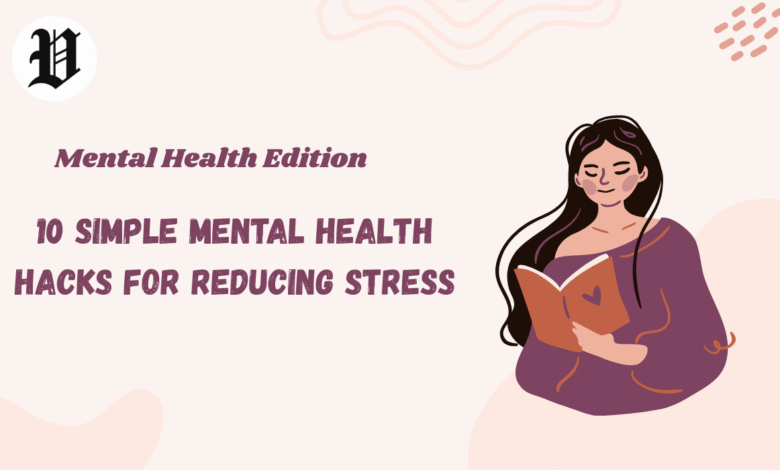10 Simple Mental Health Hacks for Reducing Stress

You know those days when life feels like it’s throwing everything at you? Maybe it’s a work deadline breathing down your neck, kids running wild, or just the weight of a never-ending to-do list. Your shoulders creep up to your ears, and your brain’s buzzing like a beehive. I’ve had plenty of those moments—trust me, I get it. But here’s the thing: you don’t need a yoga retreat or hours of free time to dial down the chaos. I’ve put together 10 simple mental health hacks for reducing stress every day, each one practical enough to fit into your life, no matter how packed it is. As someone who’s wrestled with stress through late-night work sprints and family juggling acts, I’ve leaned on these daily habits for mental health to keep my head above water. Let’s jump in and find some quick ways to reduce stress that actually work.
Deep Breathing Exercises
When stress starts creeping in, sometimes the simplest fix is just to breathe. I’m talking slow, intentional breaths—inhale through your nose for a count of four, hold it a second, then exhale through your mouth for six or eight. You can do this anywhere: stuck in traffic, at your desk, or even hiding in the bathroom for a moment’s peace.
This trick works because it’s like hitting a pause button on your body’s stress response. It slows your heart rate and tells your brain, “Hey, we’re okay here.” It’s almost too easy, but that’s why I love it.I started doing this during a crazy week of back-to-back meetings. Just a few breaths between calls helped me go from frazzled to focused. My sister, a nurse, swears by it during her shifts—she says it’s like a mini-vacation in the middle of chaos.
Progressive Muscle Relaxation
This one’s like giving your body a deliberate unwind. You tense up one muscle group at a time—clench your fists, scrunch your toes, or shrug your shoulders—hold for a few seconds, then release slowly, working from head to toe. It’s a way to let go of the tension stress loves to stash in your body.
It’s effective because relaxing your muscles sends a signal that there’s no emergency, calming your whole system. I find it especially helpful when I’m stiff from hunching over my laptop all day.
I tried this after a particularly rough week, sprawling on my couch for 10 minutes, and it was like my body sighed in relief. A friend who’s a gym coach uses it post-workout to ease both physical and mental strain—it’s become her go-to before bed.
Listen to Music
Sometimes, all it takes is a good song to shift your mood. Whether you’re into soothing acoustic vibes or blasting some classic rock, popping on a playlist can feel like a mental getaway.
Music distracts you from stress spirals and sparks a little joy, often in just a few minutes. It’s like a shortcut to feeling lighter, especially when life’s heavy.
I keep a playlist for cooking dinner—it turns a rushed chore into something I actually enjoy. A coworker told me she started listening to jazz during her commute, and it’s made her mornings feel less like a race against the clock.
Take a Quick Walk
Don’t underestimate the power of a short stroll. A 10- or 15-minute walk, focusing on your steps or the world around you, can work wonders. No gym membership needed—just your feet and a bit of fresh air.
Moving your body boosts those feel-good chemicals, like endorphins, that push back against stress. It’s also a chance to step away from screens and let your mind breathe.
I started walking around my neighborhood during lunch breaks, and it’s like a mental reset button. Once, a quick loop helped me untangle a work problem I’d been stewing over for hours—it’s amazing what a little movement can do.
Spend Time in Nature
Getting outside—whether it’s a park bench, your backyard, or a trail—feels like a gift to your soul. It’s about soaking in the rustle of leaves, the chirp of birds, or even just the smell of grass.
Nature has this way of quieting your mind and making worries feel smaller. There’s something about green spaces that just grounds you, no matter how frazzled you are.
I make a point to sit on my porch for 15 minutes daily, coffee in hand. My brother, who’s always on the go, started taking his dog to a nearby park, and he says the trees alone make him feel less wound up.
| Quick Stress Relief Hacks at a Glance | How Long It Takes | Best Place to Try | Immediate Benefit |
|---|---|---|---|
| Deep Breathing Exercises | 2-5 minutes | Anywhere—car, desk, or couch | Eases racing thoughts, calms nerves |
| Progressive Muscle Relaxation | 10 minutes | Quiet corner at home | Loosens tight muscles, helps you relax |
| Listen to Music | 5-10 minutes | During chores or commute | Lifts your mood instantly |
| Take a Quick Walk | 10-15 minutes | Around the block or park | Clears your head, boosts energy |
| Spend Time in Nature | 10-20 minutes | Backyard or local green space | Soothes through sensory calm |
| Practice Gratitude | 5 minutes | Over coffee or before bed | Shifts focus to what’s good |
Practice Gratitude
Gratitude is about pausing to notice the good stuff—like a kind text from a friend or a sunny morning. Try jotting down three things you’re thankful for in a notebook or just in your head.
It works by flipping your brain’s focus from what’s stressing you out to what’s going right. Over time, it’s like training your mind to spot the silver linings.
I do this while sipping my morning coffee, scribbling in a beat-up journal. My cousin started it during a tough job hunt, and she said it helped her see small wins, like a good interview, instead of just the rejections.
Journal Your Thoughts
Grab a pen and let your thoughts flow onto paper—no rules, no judgment. It’s like having a heart-to-heart with yourself, sorting through worries or capturing random ideas.
Journaling gets stress out of your head and onto the page, making it feel less overwhelming. It’s like decluttering your mind, leaving you clearer and calmer.
I journal at night to unwind, and it’s become my way to process the day. A friend who’s a single mom says it’s her “sanity saver,” helping her make sense of chaotic days.
Connect with Others
Reaching out to a friend for a quick chat or coffee date is like a warm hug for your soul. Sharing a laugh or venting about your day builds a sense of connection.
Talking to someone you trust lightens your mental load and reminds you you’re not alone. Even a short conversation can shift your perspective.
I try to call a buddy weekly, and it’s like recharging my battery. My neighbor, a busy dad, says his weekly beers with friends are what keep him grounded through work stress.
Declutter Your Space
Tidying up a small space—like your desk or a kitchen counter—can feel oddly freeing. It’s about creating order in one corner when life feels like a mess.
A clear space reduces that frazzled feeling and gives you a sense of control. It’s like a quick win that tells your brain, “We’ve got this.”
I tackle one shelf after dinner, and it’s surprisingly satisfying. A colleague shared how organizing her home office during a stressful project gave her a boost of calm and focus.
Laugh More
Nothing cuts through stress like a good laugh. Watch a funny video, swap jokes with a friend, or dig into a silly podcast—whatever gets you giggling.
Laughter loosens up your body and sparks joy, making problems feel a bit less heavy. Even a forced chuckle can turn real, lifting your mood fast.
I keep a stash of comedy clips on my phone for rough days. During a tense family dinner, pulling up a silly video had everyone laughing instead of arguing—it was a total game-changer.
| Fitting Hacks into Your Day | Time of Day | Suggested Hacks | Why It Works |
|---|---|---|---|
| Morning Start | 7-9 AM | Deep Breathing, Gratitude | Sets a calm, positive vibe |
| Midday Break | 12-2 PM | Quick Walk, Music | Recharges your energy |
| Afternoon Slump | 3-5 PM | Nature Time, Declutter | Clears fog, boosts focus |
| Evening Unwind | 7-9 PM | Muscle Relaxation, Journaling | Eases tension for rest |
| Anytime Fix | Flexible | Connect with Others, Laugh | Instant mood-lifters |
FAQs
What’s the quickest way to zap stress?
Deep breathing is king—just a minute or two of slow breaths can calm your nerves. It’s like a mental reset you can do anywhere.
How long until these hacks really help?
Some, like laughing or walking, feel good right away, but give them a couple of weeks to build real staying power. It’s like planting seeds for calmer days.
Do I need fancy tools for these?
Nope—just you and maybe a notebook. They’re meant to be simple, so you can start without any extra hassle.
What if I’m too swamped for daily habits?
Pick ones that blend in, like breathing while waiting for coffee or gratitude during your commute. Five minutes can go a long way.
Can these help with bigger stress issues?
They’re awesome for daily stress but not a fix for deeper anxiety. If it’s too much, talking to a pro can complement these tricks.
Are these okay for kids or teens?
For sure—try walks as family adventures or gratitude at dinner. They’re great for building lifelong calm habits.
What if a hack feels off for me?
No biggie—skip it and try another. If journaling’s not your jam, maybe music or a walk feels better.
How do I stick with these long-term?
Start small, maybe track your progress in a notebook. Sharing with a friend helps keep you on track, too.
Can I combine hacks for more impact?
Totally—pair a walk with music or breathing with gratitude. Mixing them creates your own stress-busting recipe.
What’s best for work stress?
Go for subtle ones like breathing at your desk or a quick declutter. They’re easy and keep you sharp without drawing attention.
Here’s the deal: you don’t have to overhaul your life to feel less stressed. Pick one or two of these mental health hacks for reducing stress—like a quick breath or a gratitude moment—and try them today. You’re already halfway there just by reading this, and that’s worth celebrating. Life’s too full of hustle to let stress win, so here’s to finding your calm, one small step at a time. Want more tips? Check out our guides on healthy routines and staying resilient.




